English Edition

- By CNI
- Category: English Section
- Hits: 919
CNI News
11 August 2025
There are considerations among military and political analysts whether military situation could be more widespread from the battles breaking out between the Myanmar Tatmadaw and the Kachin Independence Army (KIA) in and around Bhamo City.
After the Myanmar Tatmadaw's warships went up to Bhamo from Mandalay on August 1, 2025, the Myanmar Tatmadaw has been waging offensives to some military camps that had been captured by the KIA, and battles are severely taking place between the two sides.
Moreover, the Myanmar Tatmadaw is waging offensives to Minhla Ward near the 21 Military Operations Command, and No. 366 Artillery Battalion that has been captured by the KIA on August 4, 2025.
According to the situation of ground battles, the Myanmar Tatmadaw possibly would expand its military activities not only in Bhamo but also in the neighboring towns, the Tai Leng (Shanni) Nationalities Development Party (TNDP) Chairman Sai Htay Aung told CNI News.
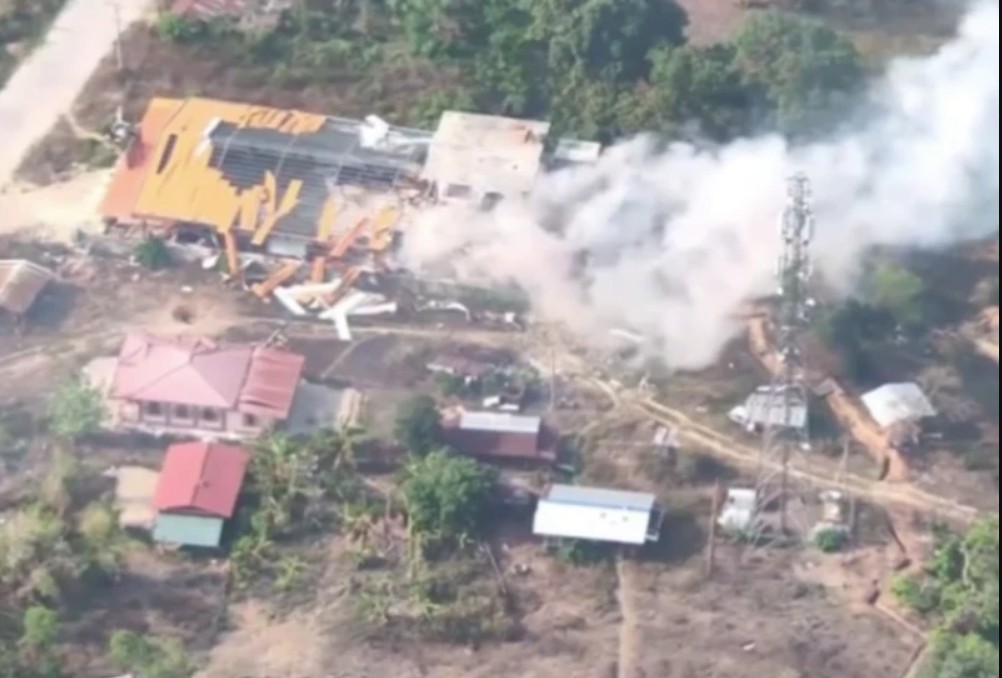
While seeing Bhamo City that has been damaged by the war
" The Myanmar Tatmadaw seems to expand its military activities not only in Bhamo until neighboring areas. I must say the Myanmar Tatmadaw has an upper hand in the Bhamo region military situation. Since a few days ago, the Myanmar Tatmadaw has been conducting a clearance operation surrounding area of the university in Bhamo, aNnd Minhla Ward near the No. 21 Military Operations Command and Min Kyaung Gon Ward near the prison. So, we can say that the Myanmar Tatmadaw has had an upper hand there." he said.
Bhamo is one of the nearest towns to Laiza where the headquarters of the KIA is based and the No-21 Military Operations Command of the Myanmar Tatmadaw is based in Bhamo as well.
Moreover, it is located on the bank of Ayeyarwady River and about 40 miles away from the Chinese border. People can go to China from Bhamo through Nam Kham and Muse in northern Shan State.
Currently, because of the Myanmar Tatmadaw's offensive en masse to Bhamo, the KIA is facing a difficult situation to re-launch an offensive, pointed out military and political analysts.
The KIA possibly would give Bhamaw to the Myanmar Tatmadaw because battles in and around Bhamo have been months long, Dr. Hla Kyaw Zaw, China-Myanmar affairs analyst told CNI News.
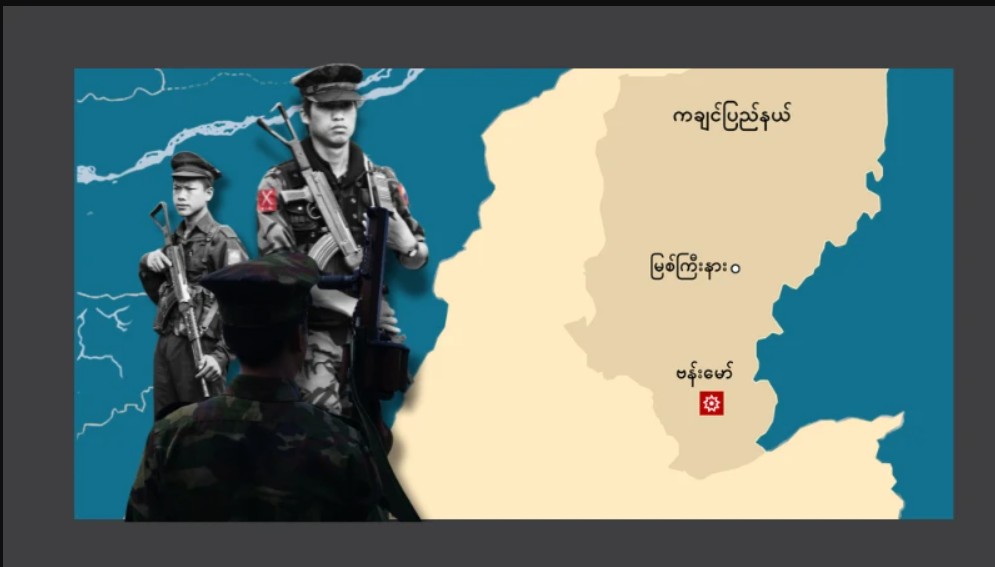
While seeing Bhamo City that is a strategic position
" It seems that the KIA might give Bhamo back to the Myanmar Tatmadaw because the entire city of Bhamo is already in ruins. The Myanmar Tatmadaw fire heavy weapons and dropped bombs on Bhamo. So I think the Tatmadaw wants to propaganize that they have regained control of Bhamo. The KIA possibly will retreat from Bhamo." she said.
Since October 2023, the KIA was able to successfully attack and capture the Myanmar Tatmadaw bases in Kachin State and northern Shan State and captured Sok Law, Chipwe, Somprabum, Injang Yang, Sadon, Dok Phong Yang, Loije, Sin Bo, Myo Hla, Momauk, Mansi, and Mabein in northern Shan State.
Currently, the National Defense and Security Council has declared a state of emergency and initiated martial law in a total of 63 townships in Kachin, Kayah, Sagaing, Rakhine, and Shan states, as well as other regions.
Fighting is ongoing in these townships between TNLA, AA, KNU, KIA, CNF, PDF, and the Myanmar Tatmadaw. Currently, the Myanmar Tatmadaw is conducting offensives against TNLA-controlled Mogok, Kyaukme, and Hsipaw, as well as exchanging offensives with the KIA in Bhamo.
Similarly, the Myanmar military has been engaged in a long-running conflict with the AA in Kyaukphyu, Rakhine State.

- By CNI
- Category: English Section
- Hits: 330
CNI News
11 August 2025
Candidates who will run in the election should be parliamentarians who represent the people rather than the party, U Li Paw Reh, chairman of the Lisu National Development Party (Dulei Party), told CNI News.
In Myanmar politics, when more candidates who won in the election represent their parties rather than the people, pointed out political commentators.
Candidates who ran the election, when they were in Hluttaw, must give priority to the country and the people rather than their parties, the Lisu National Development Party (Dulei Party) Chairman, U Li Paw Reh told CNI News.
" When a candidate becomes a member of Hluttaw, he will support only the proposal which his party submits, which should not be done like that. He should support any proposal that benefits the country, that is submitted by any party. He should not represent his party anymore. He should represent the people." he said.
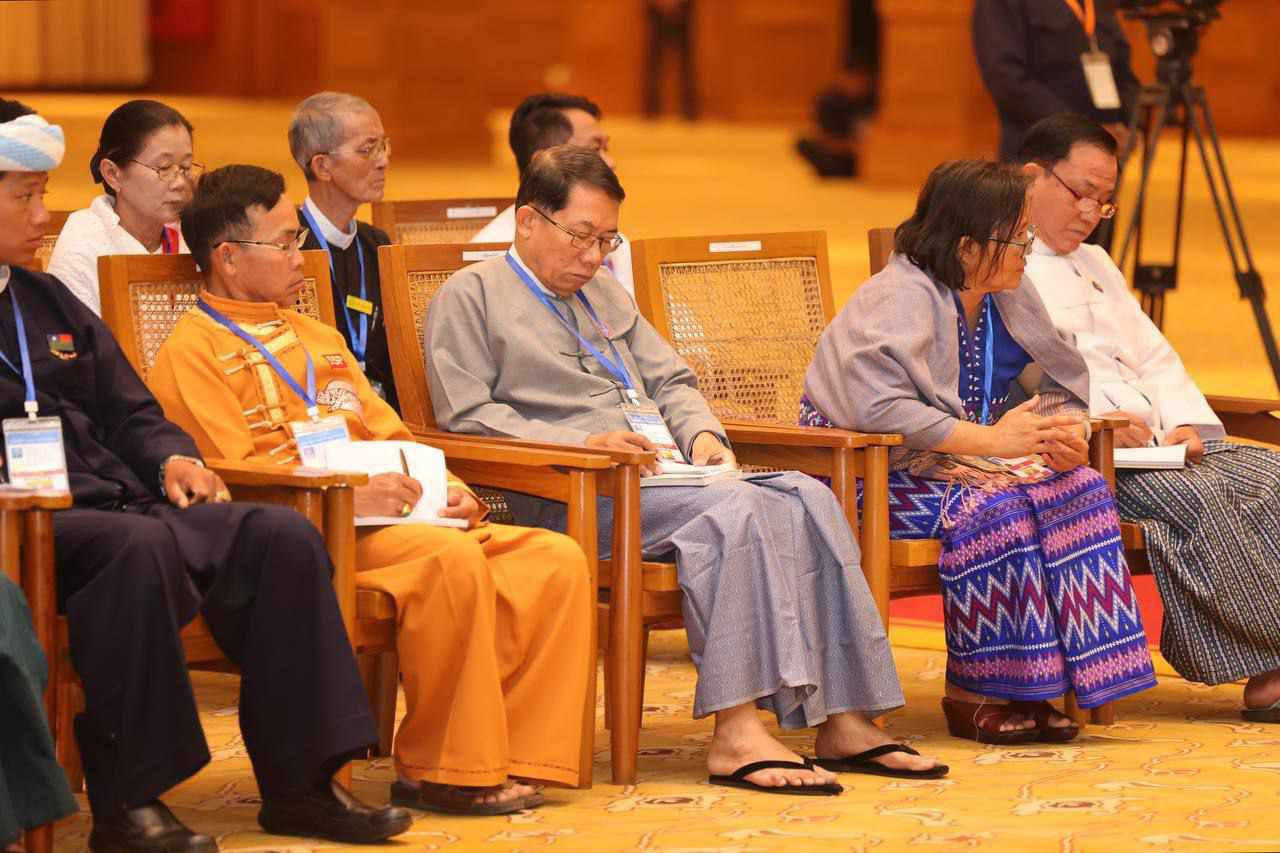
Political parties
Candidates that will enter the Hluttaw compete representing their parties and they are party representatives.
However, after they are elected, when they arrive in the Hluttaw, they have been the representatives representing both parties and the people, pointed out political analysts.
Participants in Myanmar politics often have a tendency to bear a grudge, and some parliamentarians have this tendency, pointed out political analysts.
Once the candidates are elected and enter the parliament, they become lawmakers, the Naga National Party (NNP) Chairman U Shu Maung told CNI News.
Some parties do not discuss proposals submitted by other parties and it may be because of their parties' policies, he said.
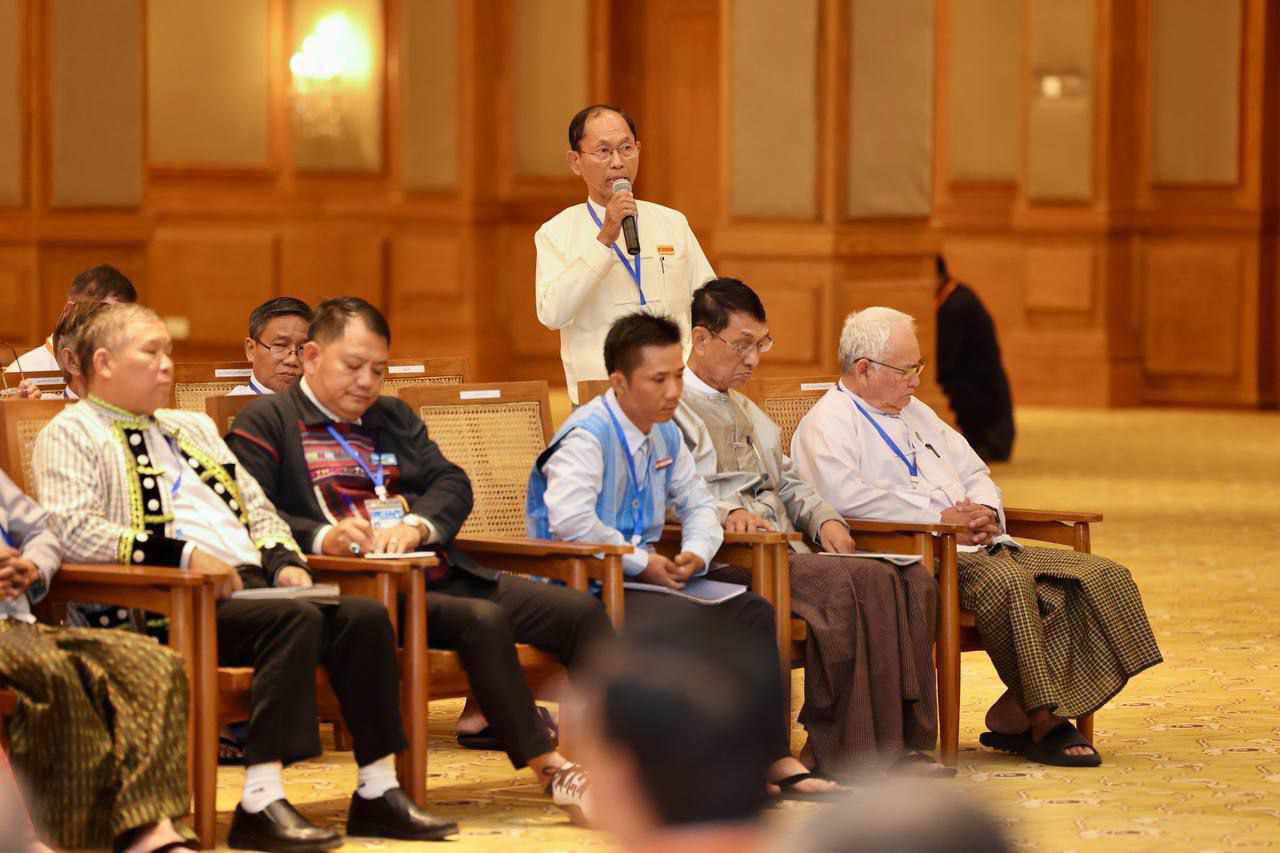
Political parties
“As elected representatives are persons with legislative power, they have to consider the interests of their constituencies, and on the other hand, they are responsible for the development, political issues, and international affairs. As he represents the people, they must be the public representatives. But as the centralization system of some parties is so strong, a proposal submitted by another party may benefit the country and might not be discussed by the parties whose centralization are strong. These parties might be ethnic parties or mainland parties." he said.
Senior General Min Aung Hlaing has promised elections will be held in December 2025 and January 2026 in Myanmar and the elections will be held in phases, according to the Union Election Commission.

- By CNI
- Category: English Section
- Hits: 356
CNI News
10 August 2025
The reason why Myanmar has not developed yet is because there are attacks among its citizens, Chairman of the National Democratic Force Party, U Htet Aung Kyaw told CNI News.
There should be no disagreements politically, ethnically and religiously in Myanmar and it was necessary to make efforts in order to walk peacefully on the path going to the multi-party democratic system, said Prime Minister U Nyo Saw.
Myanmar did not progress although it had lots of good opportunities because there were hatred and attacks among its citizens, said U Htet Aung Kyaw.
" Because there are always hatred and attacks among our citizens in our country, Myanmar, our country hasn't developed yet even though there are good opportunities. Saya Dagon Tar Yar said that there is no enemy but only lovers in politics. Participation in politics is making an attempt to change an enemy into a friend. Maintaining this idea, we'll build this country with our ethnic brothers and sisters. So, we accept what the PM said. All the organizations must be honest. With a view to the development of the country, we must maintain the loving kindness politics and there should be no disagreements. If we implement the loving kindness policy, we can't ask one side only to be honest." said U Htet Aung Kyaw.
Internal armed conflicts have been taking place since Myanmar gained her independence on January 4, 1948 because there were political disagreements and they have not been able to be resolved up to now.
Although they were talking about ethnic affairs and development, if their intentions were different from what they said, there was no reason to succeed, Executive Director of the Thayninga Institute for Strategic Studies, U Thein Tun Oo told CNI News.

" All the organizations that are related to political disagreements say that they would like to develop their regions under various titles. But is what they say? consistent with what they do on the ground? Otherwise, are there processes to be solved separately? The two sides understand these things and when all the stakeholders negotiate and discuss them, it all will be resolved. Although some EAOs are talking about ethnic causes and development, if their intentions are different from what they say, it won't be successful. There might be ethnic disagreements. If political and negotiable opportunities given by the government are discussed thoroughly by the two sides, everything will be just fine." said U Thein Tun Oo.
Due to political, religious, and ethnic disagreements in Myanmar, currently intense battles are breaking out between the Myanmar Tatmadaw and armed groups throughout the country.
Prime Minister U Nyo Saw said that all people living in the country must avoid actions that could deviate from the path of democracy and must respect and abide by existing laws in accordance with the Constitution.

- By CNI
- Category: English Section
- Hits: 474
CNI News
9 August 2025
While it would be compatible if Myanmar were to adopt a federal system, it could be problematic if it were to adopt a single form, U Htet Aung Kyaw, vice chairman of the National Democratic Force Party (NDF), told CNI News.
Since there are over a hundred ethnic groups in Myanmar, and each ethnic group is not the same, the federal system should not be a single form, he said.
“Countries with many ethnic groups like Myanmar need a federal system. Since the shape of Myanmar’s water, land, forests, and ethnic groups is not the same, a federal system that uses a single form may be a bit problematic. There will be one federal model for Kachin and another for Shan. Only if it is implemented in a way that is compatible with the land, forest, ethnic and cultural diversity will the federal system have a chance of success. Although most people and organizations are advocating for federalism, it is unclear whether all those advocating for it truly believe that federalism can succeed," he said.
The EAOs that have currently achieved confederal status beyond the federal system in Myanmar are the United Wa State Army (UWSA) and the National Democratic Alliance Army-Myla (NDAA).
if Myanmar used federalism, equal political rights must be granted, and federalism cannot be achieved without equal political rights, pointed out military and political observers.

While the peace forum was being held
Furthermore, they consider that if the federal status is to be given, it must be given to all the ethnic groups equally without giving the confederation status to any ethnic groups.
While some EAOs were talking about achieving federalism, their words and actions were different, said U Htet Aung Kyaw to CNI News. “Some EAOs only put forward the title of achieving federalism, but it seems that this is not their goal in reality, and there is a difference between what they say and what they actually do.
The main thing is that they want to govern in terms of territorial control and resource distribution, and these things can be considered as a weakness for democracy and federalism in the long term.
"In a federal system, if the central government and the state government can work together in a clear and trusting manner, this will be an advantage of the federal system. If any system cannot lay a solid foundation, the public will find it difficult to trust an administrative system whose words are inconsistent with practice, and their interest in politics will become weak," he said.
The armed groups that have signed the NCA and the government and the Tatmadaw have agreed to build a union based on democracy and federalism in Myanmar, and the political parties have accepted it.
However, due to the changing political landscape in Myanmar after February 1, 2021, some EAOs have expressed positions beyond federalism such as the establishment of a confederation or a new independent state.

While seeing Senior General Min Aung Hlaing and armed group leaders
The Arakan Army (AA) has said it will take a political status no lower than that of the “Wa” or achieve confederation status.
If necessary, it will stand as an independent state.
Kachin Independence Army (KIA) Vice Chairman Lt. Gen. Gun Maw has also stated that ethnic groups will have ideas that go beyond federalism by 2025.
Furthermore, Ta’ang National Liberation Army (TNLA) General Secretary Major General Tar Bone Kyaw said on August 18, 2022 that the Palaung people must be prepared to establish a country of their own if the situation arises.

- By CNI
- Category: English Section
- Hits: 563
CNI Interview
8 August 2025
Senior General Min Aung Hlaing has said that elections will be held in Myanmar in December 2025 and January 2026.
Then, on July 29, 2025, laws were issued to establish the electoral systems for the Region or State Hluttaw, the Amyotha Hluttaw, and the Pyithu Hluttaw, including laws to protect the election.
On the other hand, there has been a decrease in trust in voting machines and are security concerns. Similarly, people are feeling frustrated by the complexity of the election systems.
CNI News contacted and interviewed the Union Election Commission (UEC) regarding these circumstances.
Q: The election was expected to be held under the PR system, but there is controversy because it will be held under the FPTP system. I would like to know why they decided to hold it under the FPTP system.
A: According to Article 109 of the Constitution, 330 representatives are elected to the Pyithu Hluttaw through the FPTP system based on township and population.
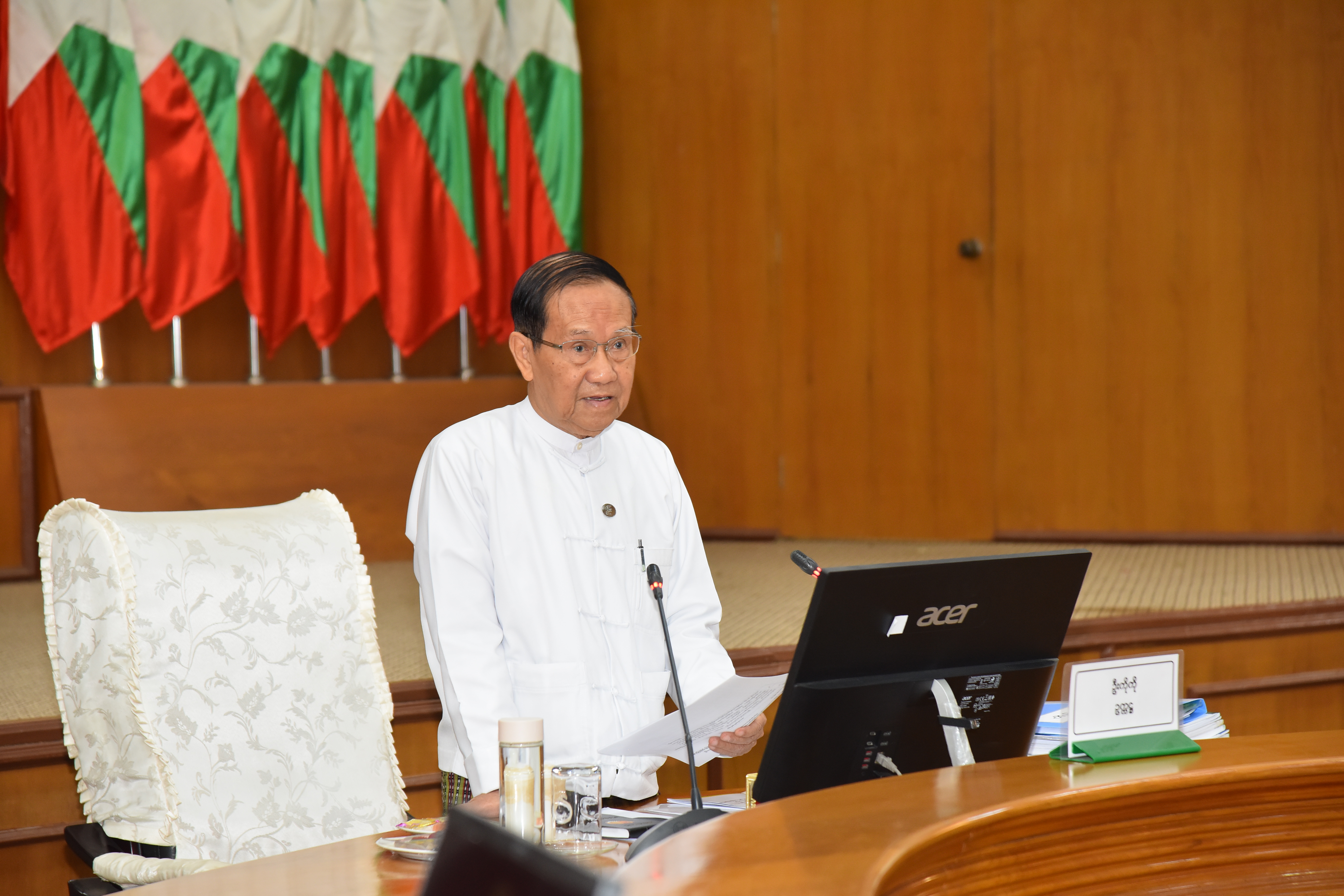
U Ko Ko, Chairman of the Union Election Commission
Q: The regional and state Hluttaws will be held using a mixed system of PR and FPTP. So, rather than a voter has to cast a ballot only, it will have to cast multiple votes, won't that cause confusion for the people who will vote? Why is it necessary to use these two systems together?
A: The Amyotha, the regional and state Hluttaws have been iposed to be elected with a mixed proportional representation system, which includes the FPTP system as well as the PR system. A voter needs to cast only one vote. There is no confusion for voters.
It is a system that combines the advantages of the FPTP system with the advantages of the PR system. Even if you don't get a representative with FPTP, you can get a representative with PR.
One representative from each self-administered region and region will be elected to the Amyotha Hluttaw through FPTP. The ethnic representatives to the regional and state Hluttaws will also be elected through FPTP.

While political parties were being explained the voting machine
Q: According to the voting system for the upcoming election, voters must use the machine. However, since Myanmar has a large grassroots population and the elderly are not very tech-savvy, wouldn't it make people confuse to vote by machine and isn't there a decrease in the number of voters?
A: In the upcoming election, MEVM electronic voting machines will be used in all polling stations nationwide. Training courses on how to use the voting machines is being provided in regions and states.
We are working to ensure that voters can vote professionally using voting machines. We are also conducting awareness programs through the media. The system allows voters to vote simply by clicking a button. There should be no confusion or difficulty for the public.
Q: Some people consider that voting machines can technically change the results at will, so it is difficult to trust. So how can the voting machines now be held accountable for producing accurate results?
A: Voting with a machine does not mean that the results can be changed as you like, technically. The machine will record voters' votes and display it accordingly. Voters can also check it out.
Those who don't want the election will say, "I don't believe it" or "It's impossible to get a correct result." The reliability level of these voting machines makes it easy to vote.
The machine displays the votes as they were cast. There are no errors. It is easy, accurate and fast to operate. The correct voting results can be retrieved within minutes and can be checked.
The voting machine does not include Internet, Wifi, or Bluetooth systems. It does not include Windows operating systems (OS) like computers. It is a microcontroller system, so it is a very simple and secure system.

While a voter was preparing to vote
In accordance with the Myanmar Standards Law (2014), we have obtained national-level certification for the quality and standards of voting machines, ensuring the reliability and accountability of the voting machines used in the elections.
Q: Next, I would like to know if the polling stations inside the military compound will be moved outside, or will voting be done inside the military compound?
A: Neither the Election Law nor the Rules and Regulations contain the term “in-military compound polling stations.” Section 36, Sub-section (a) of the Election Law states that “the Commission may determine the number of polling stations to be set up in each ward and village tract as appropriate, depending on the number of eligible voters and the local conditions, or may delegate the responsibility to the relevant sub-commissions at different levels.
Polling station locations are determined based on the number of voters and distance to the station, with the aim of ensuring that eligible voters (including the disabled) living within the ward or village tract can vote easily, that all voters can vote during the designated voting time, and that voting is secret. Election observers are allowed to observe the location of polling stations, the number of polling stations, and the voting process. This has already been stipulated in the rules.
Q: I would like to know if the people can vote at places where they are currently staying in order to avoid losing their right to vote or they must vote at places where they were born.
A: It is important that the public does not lose their right to vote. The voting list will be available where their Household Registration Form (66/6) is listed.
However, there are rules that allow people to vote in the ward, village tract, where they have lived for at least 180 days from the area where the voting list is located. You can apply using Form (3-A) and vote at the location you arrive.
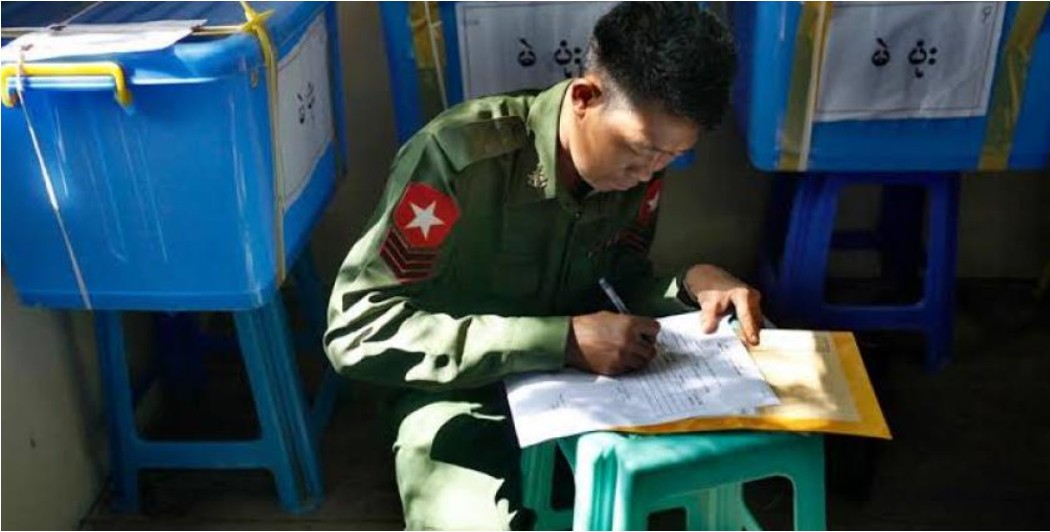
While seeing a Tatmadaw member and ballot boxes
Q: If I am allowed to vote in the area I am in, I would like to know if I can vote by showing my National Identity Card or Smart Card or what other documents/identifications are required.
A: According to the election law, to be eligible to vote, you must be 18 years of age on the day of the election. You must hold a citizenship card, a guest citizenship card, or a naturalization certificate.
You must also be on the voter list. In order to vote at the polling station, you must show your citizenship card, which is your legal proof of citizenship.
Q: The last question I would like to ask is that the security concerns regarding the upcoming elections are so great that it may be difficult for people to come to the polling stations to vote. In this case, they say that the voter turnout may be very low. How can you provide security guarantees? I would like to know if there is a system that allows people to vote from their homes or wherever they are, instead of having to go to the polling station.
A: Security is important for the elections. The government and security and law enforcement agencies will take responsibility for election security. According to the election law, if the security situation for voting is not safe, the election in that constituency can be postponed.
Election security and management issues will be handled systematically. According to the election law, if you are on the advance voter list, you are allowed to vote in advance.
If you are not eligible to vote in advance, you must vote at the polling station.
The law only allows people with leprosy, those suffering from serious illnesses, the elderly, and those who have given birth at home to vote from home in advance.

- By CNI
- Category: English Section
- Hits: 358
CNI News
8 August 2025
Acting President U Myint Swe passed away at 08:28 a.m on August 7, 2025 and he would be honored with the pageantry of a state funeral, reported the Information Team of the National Defense and Security Council.
He passed away at the 1000-bed Tatmadaw Hospital in Mingaladon, Yangon.

- By CNI
- Category: English Section
- Hits: 411
CNI News
7 August 2025
The emergence of Hluttaw is urgently needed to end the forced conscription of civilians by armed organizations during the ongoing civil war in Myanmar, point out military and political analysts.
A civil war began in Myanmar three months after independence on January 4, 1948, and continues to this day.
During the civil war, various armed groups fighting against the Myanmar Tatmadaw enacted various laws to force civilians to serve in the military, and the Myanmar Tatmadaw also enacted the Military Service Law on February 10, 2024.
The Myanmar Tatmadaw is recruiting 5,000 people per batch and now it has already recruited until the 15th batch. The ethnic armed groups fighting against the Myanmar Tatmadaw are recruiting one person per household.
An elected Hluttaw by the people is needed to ensure that there is no forced military service, Sai Htay Aung, chairman of the Tai Leng (Shanni) Nationalities Development Party, told CNI News.
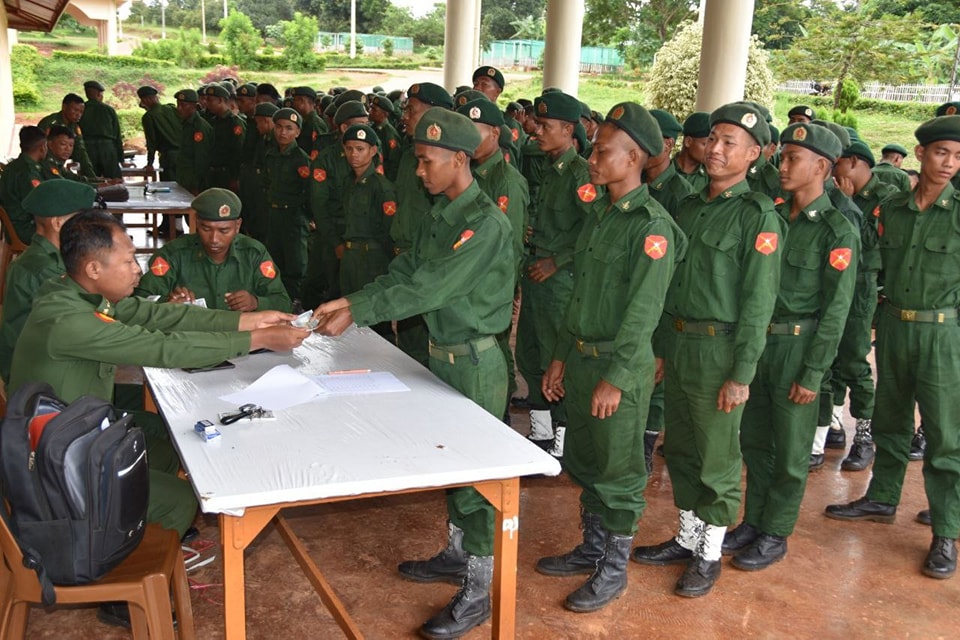
Military trainees of the Myanmar Tatmadaw
"When soldiers died in battle, some armed groups arrested civilians and recruited them into the war. The Myanmar Tatmadaw enacted the conscription law and recruited by force. If there is no civil war in the country, every citizen should join the military and serve in the military. But there is a civil war in the country. So, our citizens are fighting against one another. It is very dangerous. We need a Hluttaw elected by the people to solve this problem. Because there is not a Hluttaw for the time being, it is hurting the people badly." said Sai Htay Aung.
In one country, the current president has to implement the People's Military Service Law, while on the other hand, the head of the National Defense and Security Council is the Commander in Chief of the Defense Services, Dr. Aye Maung, chairman of the Arakan Front Party (AFP), told CNI News.
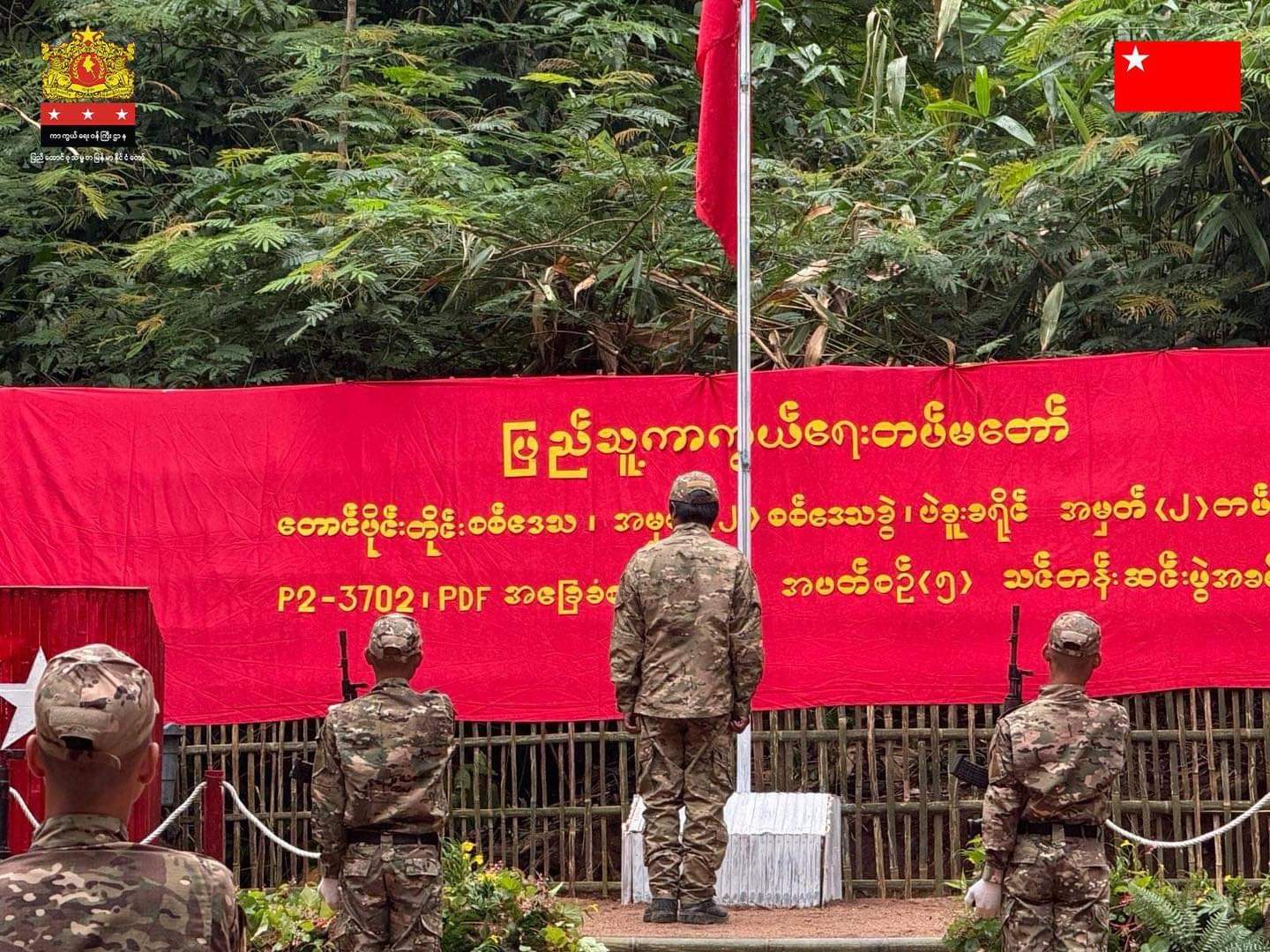
While a PDF military training graduation ceremony was being held
"Arresting for recruitment was related to imposing martial law in unstable areas during the SAC era. Now martial law has been revoked in some areas. According to Chapter 8 of the Constitution, martial law is a state of emergency. The rights of a citizen has been revoked. The National Defense and Security Council (NDSC) is responsible to regain the rights of a citizen. Now the government led by General Nyo Saw is not a civilian government, but it is led by the Prime Minister who has taken off the military uniform. On the other hand, the chief of the NDSC is the Commander in Chief of the Defense Services. You will understand if these two things are weighed, I think." said Dr. Aye Maung.
Since civilians and youths are being recruited in the civil war breaking out in Myanmar, they are living in fear and some of them are fleeing to foreign countries.
Others are displaced and are living in other places within the country and facing a variety of troubles. Only if a Hluttaw emerged, could forced conscriptions stop, pointed out military and political analysts.
Currently, elections in Myanmar are scheduled to be held in December 2025 and January 2026.

- By CNI
- Category: English Section
- Hits: 511
CNI News
7 August 2025
The Myanmar Tatmadaw may prioritize military action in areas that pose a direct threat to Naypyidaw, Colonel Khun Okkar, chairman of the Pa-O National Liberation Organization (PNLO-NCA/S), which has signed the NCA, told CNI News.
Furthermore, efforts will have to be made for a certain period of time to successfully hold elections, and efforts will have to be made until a new government and parliament emerge, he said.
“The military may try to regain military dominance in the so-called Central Region - Sagaing, Magway, and Mandalay regions because these regions can directly threaten Naypyidaw. I think the election must be at least partially successful for legitimacy," he said.
The National Defense and Security Council announced on July 31, 2025, that a state of emergency has been declared in 63 townships in the regions and states for 90 days in order to effectively maintain regional peace and stability and enforce the rule of law.
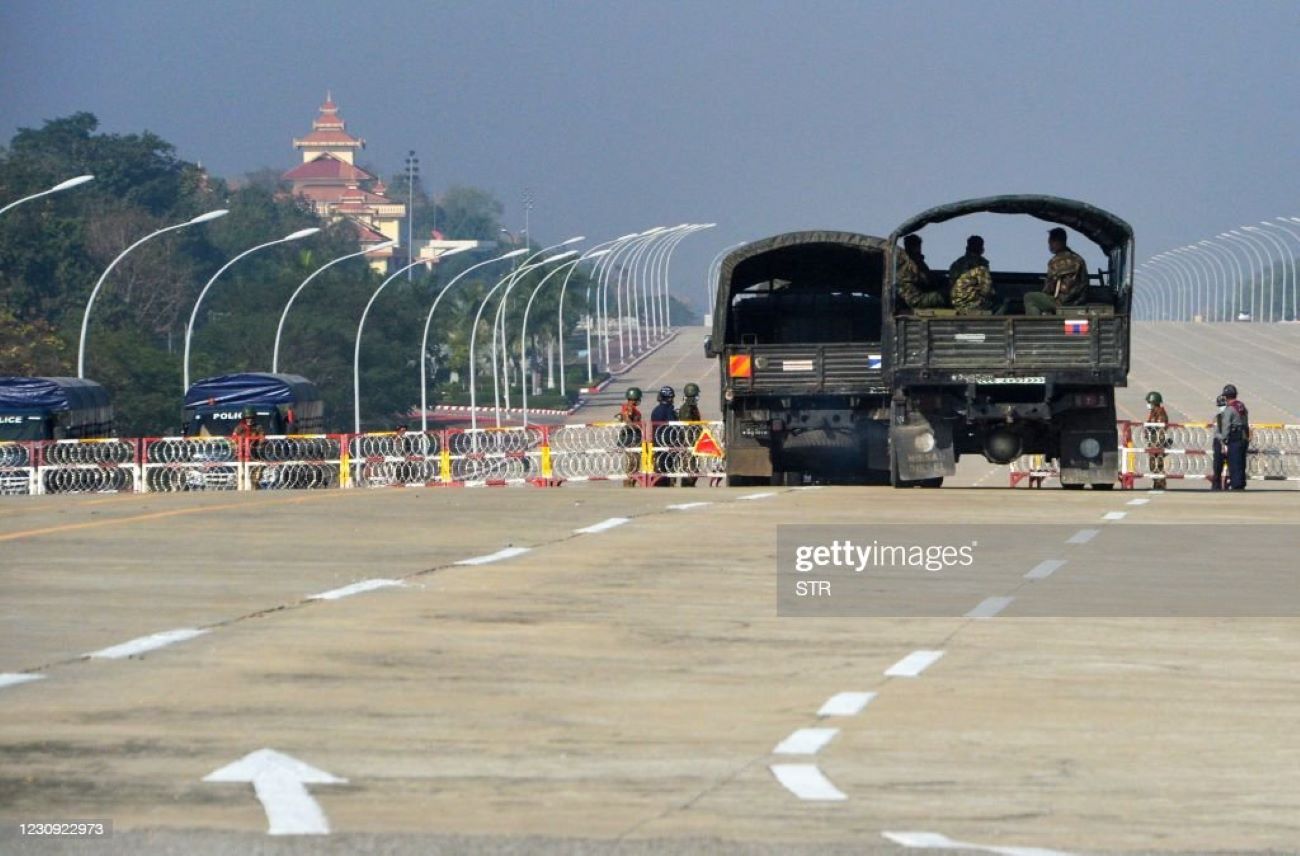
While security forces have been deployed in Naypyidaw
These townships are 5 townships in Kachin State, 3 townships in Kayah State, 2 townships in Kayin State, 7 townships in Chin State, 9 townships in Sagaing Region, 5 townships in Magway Region, 3 townships in Mandalay Region, 14 townships in Rakhine State, and 15 townships in Shan State.
Hopan Township in the “Wa” Special Region, Mong La Township in the Mong La Special Region, and Laukkai Township in the Kokang Special Region are remarkably included in the 15 townships in Shan State, where a state of emergency has been declared.
The Tatmadaw is currently not sure which region it will attack, and may carry out military operations depending on the places where the opposing forces.are fighting, Dr. Hla Kyaw Zaw, an analyst on China-Myanmar affairs, told CNI News.
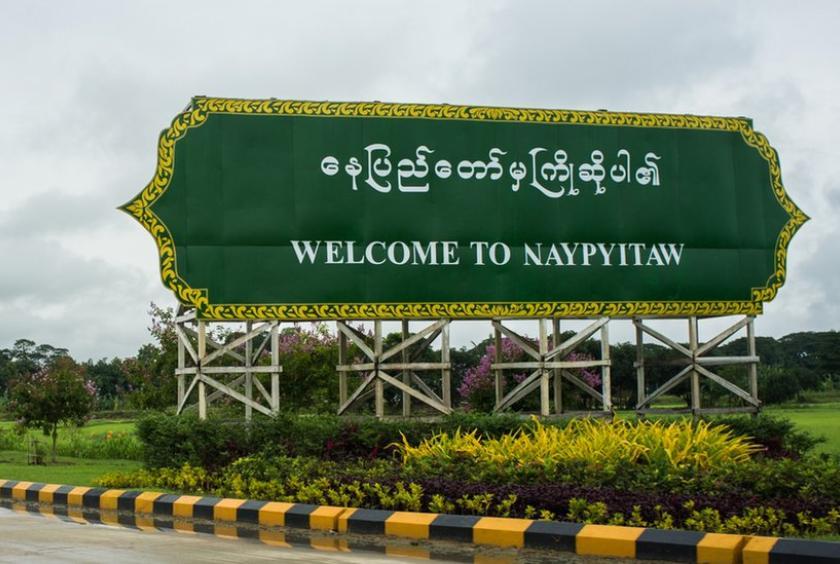
Naypyidaw
“If the AA attacks, the Tatmadaw will go to that attack area. If there are battles in Sagaing Region, it will go to Sagaing. If it’s Bhamo, it will go to Bhamo, I think. They don’t seem to have a systematic plan for which area to attack and how to attack. There are no people in the Tatmadaw who can coordinate and execute strategically. They have nothing to recover from. But they have all their basic needs. It's not as easy as we think to defeat them in a short time. I think they will continue to fight as long as they can as long as they can recruit reinforcements," she said.
The 63 townships where the National Defense and Security Council declared a state of emergency are those where fighting is taking place between TNLA, AA, KNU, KIA, CNF, PDF, and the Myanmar Tatmadaw.
Currently, the Myanmar Tatmadaw is conducting offensives against TNLA-controlled Mogok, Kyaukme, and Hsipaw, while it is waging defense operation not to lose control of Bhamo that the KIA is launching an offensive.
Similarly, clashes are also taking place between the Myanmar Tatmadaw and armed groups in Rakhine State, Kayin State, Sagaing Region, and Chin State.

- By CNI
- Category: English Section
- Hits: 496
CNI News
7 August 2025
Leaders of ethnic armed organizations (EAOs) who participated in the drafting of the agreement will be invited to the 10th anniversary ceremony of the signing of the Nationwide Ceasefire Agreement (NCA).
Pa-O National Liberation Organization (PNLO-NCA/S) Chairman Colonel Khun Okkar told CNI News. The signing of the Nationwide Ceasefire Agreement (NCA) will be10 years old on October 15, 2025.
When such an invitation is made, a renegotiation issue on the NCA path may arise, and the paths may change again in October, chairman of the PNLO-NCA/S, a member of the NCA, told CNI News.
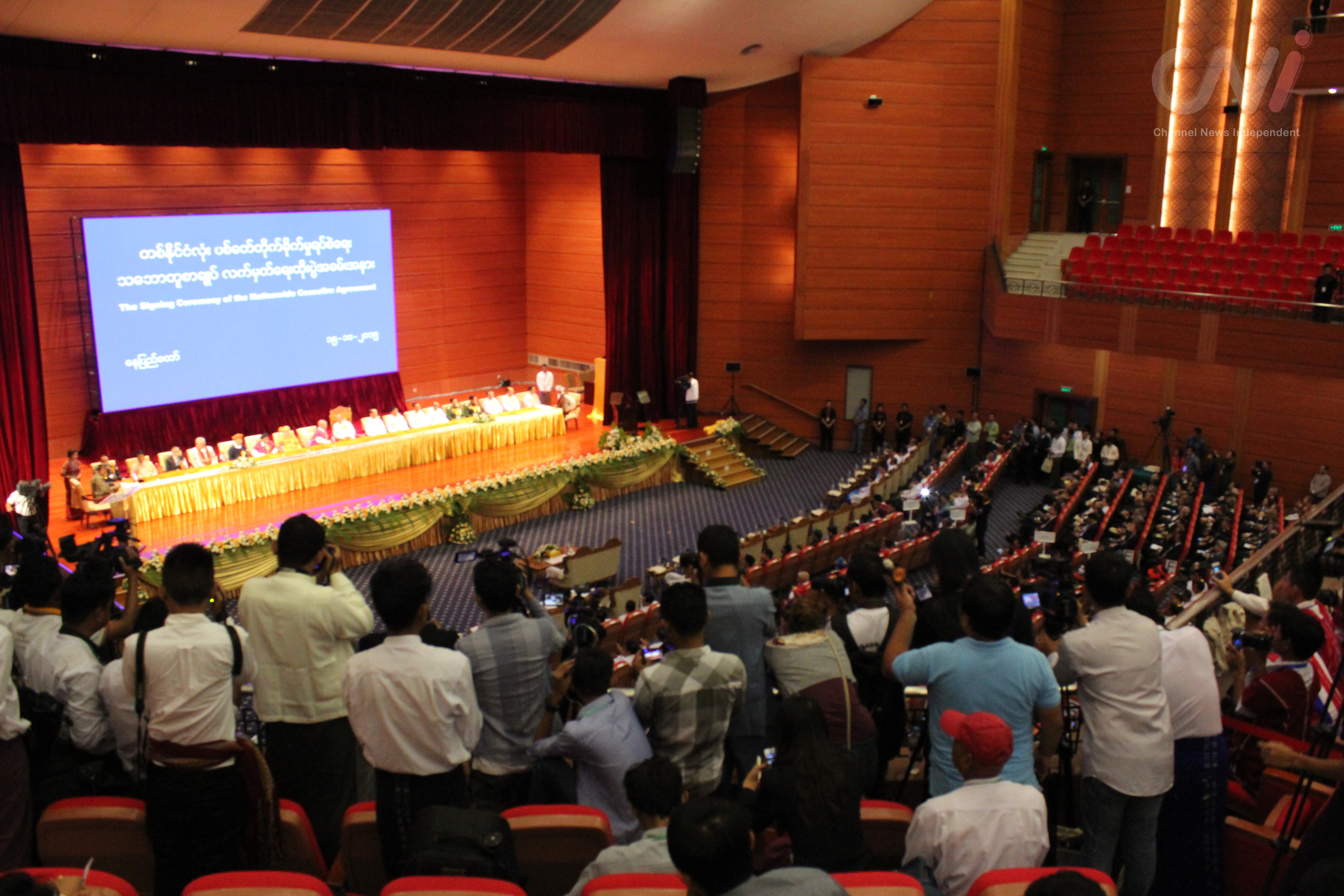
While the NCA was being signed
" There are EAO leaders who participated in the NCA drafting in person even though they didn't sign the NCA. Leaders from the KIO and KNU were also included. I heard they will be invited to the upcoming 10th anniversary of the NCA signing ceremony in October. If they are invited, put aside the rare earth issue and the Bhamo battle for a while, a renegotiation issue on the NCA path may arise. Let no one be disrespected, let no one lose, let no one win, there may be a relaxation as the people who wrote the NCA will meet again to continue on the path of the NCA. So I think the trends may change again in October. In any case, I estimate that by October, armed conflicts, attacks, hostilities, public suffering, earthquakes, and wars will all decrease slightly," he said.
It is now August and there are only two months left to celebrate the 10th anniversary of the NCA, but ethnic armed groups are not in a position to attend due to differences of opinion within the organization, Myanmar political analyst Dr. Aung Myo told CNI News.
"The 10th NCA anniversary celebration is just two months away. According to the current situation, the government has already had an upper hand. Especially the KNU and KIA need decisions within their party and organization to reverse their current wrong path. It will be convenient if Saw Mutu Say Phoe's people who want peace are reinstated in the KNU. But it's not easy to happen immediately within two months. They won't be able to call a conference. I think we believe that this side (the Tatmadaw) will invite them. But I don't think they will be able to attend." said Dr. Aung Myo.
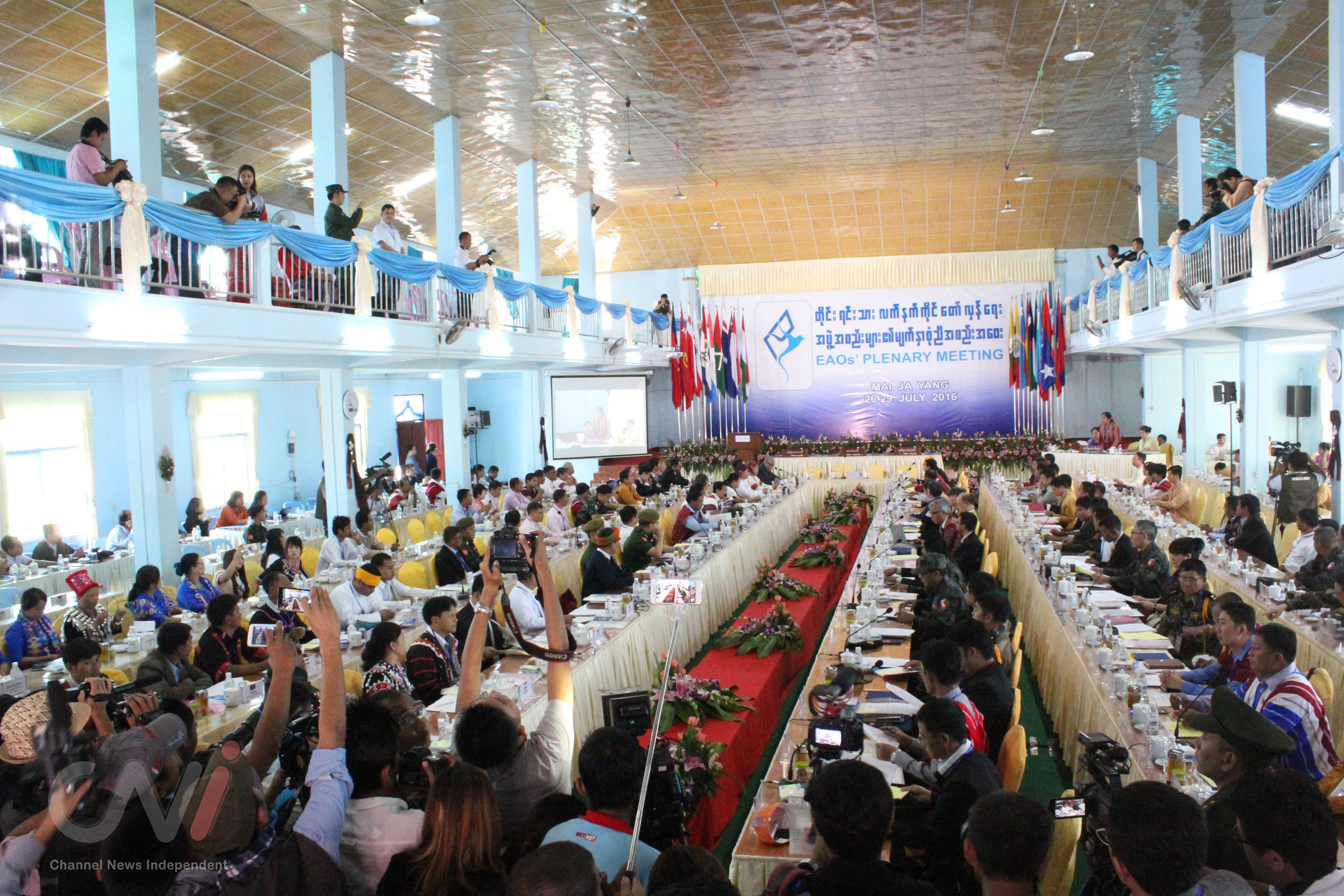
While ethnic armed organizations were holding a conference
The government led by U Thein Sein offered a ceasefire on August 18, 2011, and held talks with 21 ethnic armed organizations. Then, between 2011 and 2012, 14 state-level and union-level ceasefire agreements (Bilateral) were signed with ethnic armed groups.
Negotiations for the NCA agreement began in 2013, and a draft of the NCA agreement was received in August 201.
After receiving the draft NCA, it was signed by KNU, RCSS, ALP, DKBA, KNU/KNLA-PC, PNLO, CNF, ABSDF on October 15, 2015, and by the NMSP and LDU on February 13, 2018.
These 10 armed groups have been conducting peace talks for years under the name of the Peace Process Steering Team (PPST).
However, after 2021, disagreements arose among the members, and the Karen National Union (KNU), the Chin National Front (CNF), and the All Burma Students Democratic Front (ABSDF) decided to wage armed resistance against the Tatmadaw, claiming that the NCA had collapsed, and have been waging battles up to now.



